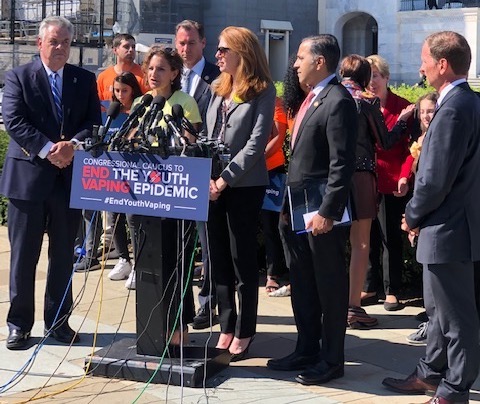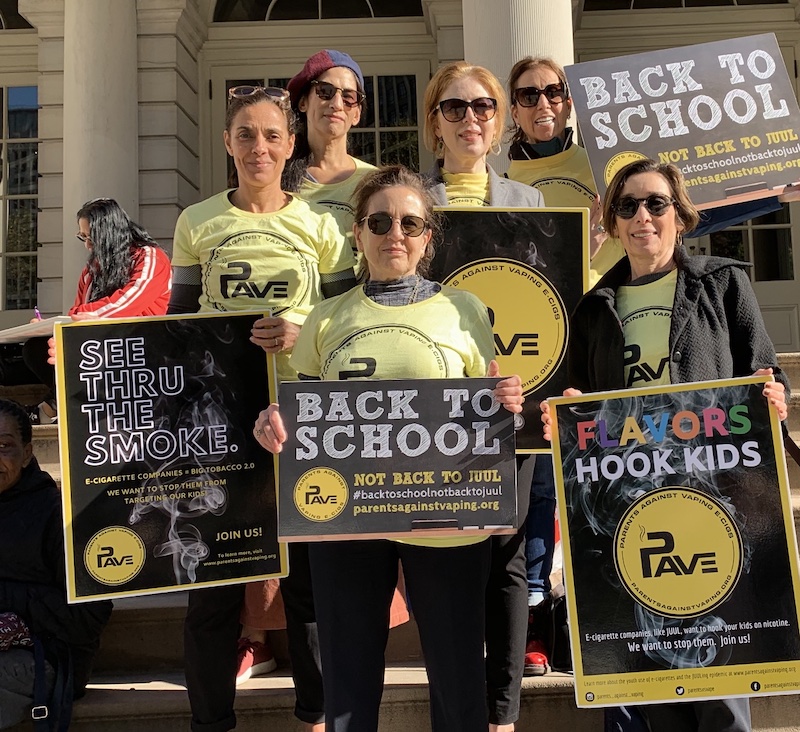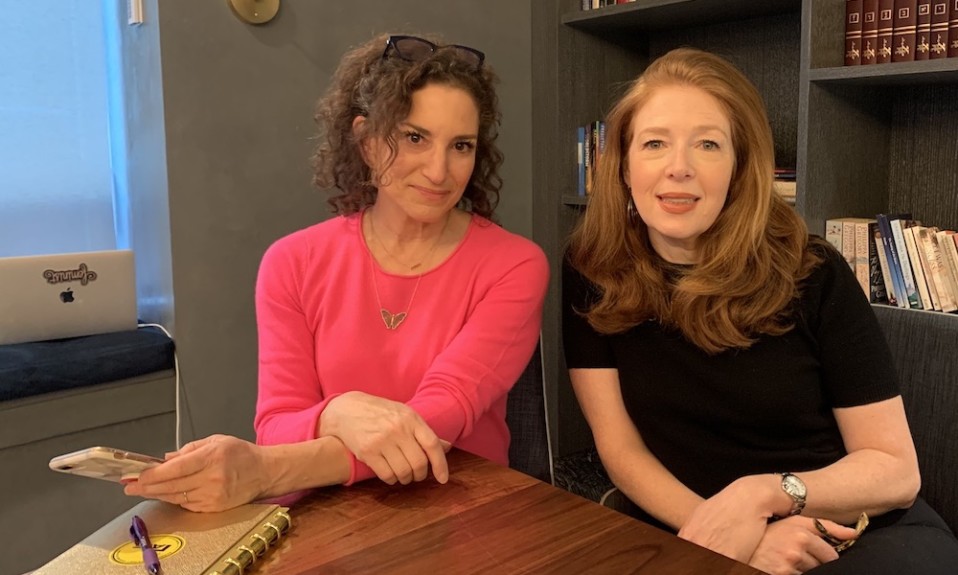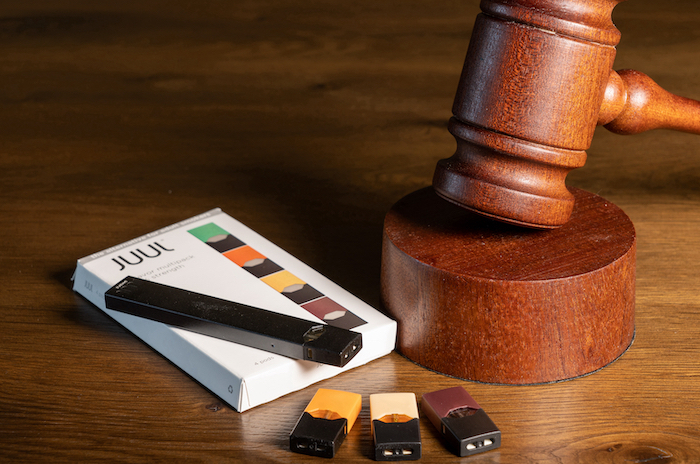Parents Against Vaping e-cigarettes—an anti-vaping advocacy organization led by moms—continues its fight to shield minors from nicotine addiction
By Jennifer Taylor
There’s a moment for some mothers when their child grows up right before their eyes.
That moment for friends Meredith Berkman and Dorian Fuhrman arrived on July 24, 2019. But it was in the least likely of houses—the United States Capitol. On the floor of a House of Representatives committee hearing room, Caleb Mintz (Berkman’s son) and Phillip Fuhrman, sat before legislators to give testimony about a visit to their school by a presenter from e-cigarette manufacturer Juul two years earlier, when they were in 9th grade. The presenter told students in an unsupervised assembly—that is, with no teachers present, so the kids could talk freely—that they shouldn’t vape. At the same time, the presenter misinformed the teens, telling them that e-cigarettes were safe and even privately showing the two boys such a device.
“Would I ever have seen myself in public health in tobacco control of all things? Never in a million years. I feel like this chose me.”
—Meredith Berkman, cofounder, PAVe
The story was shocking and hard for the New York City moms to hear from their adolescent sons. But visiting the highest level of government was something entirely different. Inside the packed committee room with the boys sitting side-by-side before microphones, some of the questioning went like this:
U.S. Rep. Raja Krishnamoorthi (D-Ill.), chairman of the Subcommittee on Economic and Consumer Policy: “You and Phillip approached the presenter when the assembly concluded. What motivated you to even approach him in the first place?”
Caleb: “I believed the presenter was sending mixed messages by saying Juul is totally safe and following up every ‘totally safe’ statement with ‘but we don’t want you as customers.’ I saw a mixed message being sent, and I believed that the presenter was playing on the rebellious side of teens, where when teens are told not to do something, they are more likely to do it.”
And later:
Krishnamoorthi: “Phillip, were you addicted to Juul at the time of this presentation.”
Phillip: “I was.”
Krishnamoorthi: “And when Caleb asked the presenter what he should do if he had a friend that was addicted to nicotine, was Caleb referring to you?”
Phillip: “He was.”
Krishnamoorthi: “How did the presenter answer Caleb’s question of how he could help his nicotine-addicted friend, namely you?”
Phillip: “Since Caleb was not specific on what kind of nicotine [his friend] was addicted to, whether it was an e-cigarette or cigarettes, the speaker thought that he was talking about cigarettes. And he said that he should mention Juul to his friend because that is a safer alternative than smoking cigarettes, and it would be better for the kid to use.”
Over the teens’ shoulders the moms nodded in agreement, support and even defiance as the boys recounted their stories nearly three years ago.

The incident inside the school horrified Berkman and Fuhrman. But at the time, Berkman tells TreatmentMagazine.com, they vowed they weren’t going to publicly share what happened inside the school until the time was right.
“We’ll be doing that in Congress one day,” Berkman recalls, adding, “We wanted it to have maximum impact.”
Parents Against Vaping e-cigarettes Takes Root
In the months leading up to that 2019 congressional testimony, Berkman and Fuhrman weren’t content to sit idly by, waiting for that moment. Feeling under attack, in 2018 the two decided to fight back. They did it by forming Parents Against Vaping e-cigarettes (PAVe), the first national advocacy group that solely represents parents’ voices against vaping.
Since then, founders Berkman, Fuhrman and Dina Alessi have expanded the grassroots organization, which is made up mostly of volunteers across the country. From an initial website that provided resources, it has grown to support and educate parents through webinars and a Facebook group. PAVe also works with partners to lobby for regulatory changes and federal and local anti-tobacco legislation. Recently, the organization launched a campaign called “Vapes are Trash,” which espouses the dangers that vaping causes not only to a person’s health but also to the environment. Additionally, Berkman and Fuhrman host a podcast, Big Tobacco Messed with the Wrong Moms, in which the two interview guests and talk about a range of topics related to e-cigarettes. And on May 24–25, PAVe is hosting its second annual conference, Clear the Vapor 2022.
“[Flavored e-cigarettes] are still accessible. Kids are still able to get them at convenience stores or from each other.”
—Dorian Fuhrman, cofounder, PAVe
A large part of their work, however, is tending to emails from desperate parents seeking help for their teens, who, like Fuhrman’s son, became addicted to nicotine through vaping. It wasn’t long after they launched the PAVe website that pleas from parents began to pour in. One email, in particular, is etched in their memories, from a California mother whose 14-year-old daughter was attending a treatment center for the second time because she had graduated from nicotine to other substances.
What they have found over time, according to Fuhrman, is that parents are uninformed about e-cigarettes and what they do to a developing child. Parents are shocked by the symptoms—extreme outbursts of anger, depression, anxiety, nausea, weight loss and chronic stomach aches. “The stories are very similar,” Fuhrman says.
Equally frustrating for the moms is that the flavored e-cigarettes remain on the market. In May 2020, New York state prohibited the sale of flavored vapor products that do not have approval of the Food and Drug Administration (FDA). To date, no e-cigarette has been approved by the FDA as a cessation device, according to the agency’s website. “More research is needed to understand the potential risks and benefits these products may offer adults who use tobacco products,” the FDA notes. Yet Berkman says she routinely pops into vape shops and is able to purchase such products from retailers who pull them out from under the counter. Banning flavored tobacco products remains their top priority. So far, five states have implemented such bans: Massachusetts, New Jersey, New York, Rhode Island and California. The products remain legal in California, where voters will be asked in November if they want the ban upheld.
“[Flavored e-cigarettes] are still accessible. Kids are still able to get them at convenience stores or from each other,” Fuhrman says.
A Mother’s Purpose
Berkman and Furhman once followed the same routine as many other moms, toting children to sports and activities. But they’ve been transformed since the day their boys came face-to-face with the Juul representative. “Would I ever have seen myself in public health in tobacco control of all things? Never in a million years,” Berkman says. “I feel like this chose me.”

With Caleb in college now, Berkman reflects on their journey with somewhat mixed emotions. “Sometimes I say to him, ‘I just want to hug you and say thank you for changing my life.’ And sometimes I want to shake him and say, ‘Why did you have to change my life?’”
Meanwhile, that day on Capitol Hill had an undeniable impact. The boys’ testimony was taken as evidence by the FDA that Juul had marketed its product to kids. For Berkman and Fuhrman, the outcome was “incredibly satisfying.” The teens wanted to speak from their heart about what happened inside their school, but Berkman saw in her son something more. “I felt like he became an adult in that room,” Berkman says.
When the hearing was over, they stepped outside. Caleb turned and said, “How did I do, Mom?”
She looked at him with the approval he was seeking and said, “You know how you did.”













